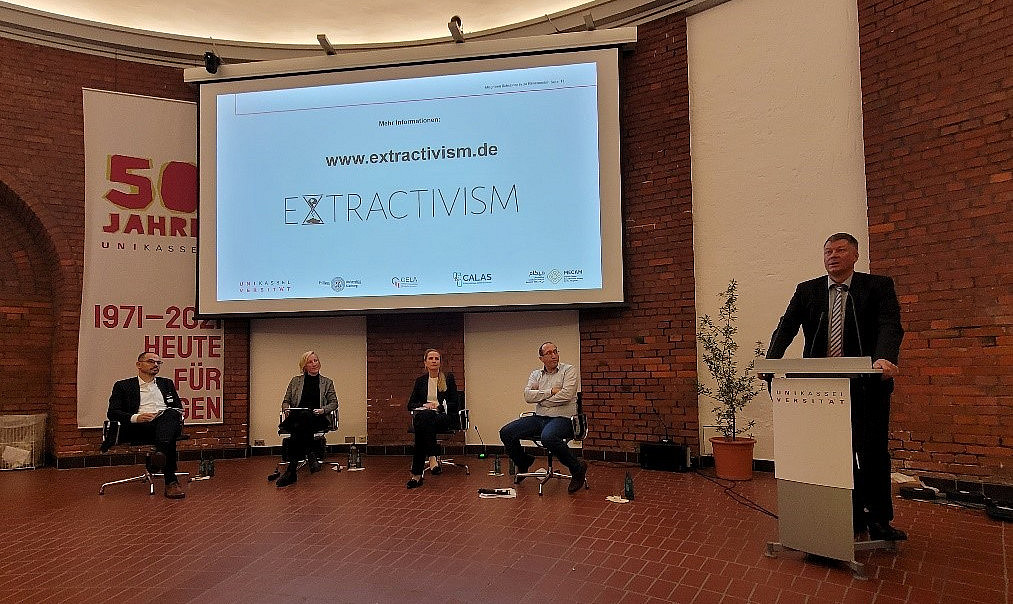This page contains automatically translated content.
With green raw materials into the climate change?
 Image: University of Kassel
Image: University of KasselClimate change has arrived on the political agenda. E-mobility, the role of new technologies and the hope for non-fossil energy sources are the focus of public attention. However, the global scope of such strategies is hardly discussed. What do these proposals mean for the extraction of old and new raw materials as well as for traditional but also future producing countries? The joint project "Raw Materials Extractivism" took these questions as the starting point for its ceremonial project opening. At the opening event, representatives from political institutions and civil society discussed together with the project team the question "With green raw materials into the climate change? Opportunities and risks from an international perspective" and highlighted the relevance of the project topic.
After words of welcome by Prof. Dr. Michael Wachendorf, Vice President for Research at the University of Kassel, and Prof. Dr. Michael Bölker, Vice President for Research and International Affairs at Philipps-Universität Marburg, Prof. Dr. Hans-Jürgen Burchardt (University of Kassel) presented the future work of the project network. The panel discussion was followed by Johanna Beate Wysluch (Gesellschaft für Internationale Zusammenarbeit), Hannah Pilgrim (Arbeitskreis Rohstoffe, PowerShift e.V.) and Dr.-Ing. Sven-Uwe Schulz (Bundesanstalt für Geowissenschaften und Rohstoffe, Deutsche Rohstoffagentur). Prof. Dr. Rachid Ouaissa (Philipps University Marburg) moderated the discussion.
In their welcoming remarks, the vice presidents of both universities emphasized that the research project not only brings together different regions of the world. They also made clear that the project network is at the same time the only cross-university project that strengthens the cooperation of both Hessian universities by linking the participating area focal points as well as the BMBF Merian Centers located at both universities.
In his lecture, Prof. Dr. Hans-Jürgen Burchardt focused on the international significance of the social model of extractivism, which gives the research project topicality and relevance. Burchardt emphasized that a few countries will gain in importance through new raw materials and that global interactions will also change, but that too little is still known about future winners and losers. Researching these dark sides of sustainability is the goal of the project network.
Johanna Beate Wysluch argued that raw materials should be given their value and that this value should not only be thought of in economic and ecological terms, but also in social terms. This discussion point was taken up by Hannah Pilgrim, who called for the question of raw material justice to be included in the climate justice debate. For Dr.-Ing. Sven-Uwe, the raw materials issue has not received the attention it deserves in the political debate over the past decades. There was thus a consensus on the podium and in the audience that the research project has its finger on the pulse.
The German Federal Ministry of Education and Research (BMBF) is funding the research association of the University of Kassel and Philipps University of Marburg with more than two million euros for an initial phase of three years. In addition to the two project leaders Prof. Dr. Hans-Jürgen Burchardt (University of Kassel) and Prof. Dr. Rachid Ouaissa (Phillips University Marburg), the project is coordinated by Dr. Hannes Warnecke-Berger (University of Kassel).
The research network brings together an interdisciplinary and international team of researchers and visiting scholars. The project team will jointly explore the development model of commodity extractivism and will focus its investigations on countries that have largely specialized their economic production on the extraction and export of non-renewable commodities. Globally, more than half of the world's nations thrive on commodity extractivism. Latin America and the Maghreb are exemplary for this model and have special significance for Germany.
Further information on the joint project can be found at www.extractivism.de.